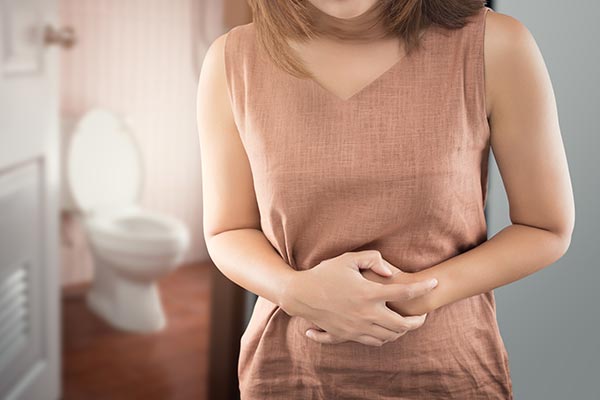9 Conditions that can cause low back pain and constipation
03/27/2020 / By Divina Ramirez

Constipation – a condition marked by infrequent bowel movement and difficulty defecating – is mainly caused by dehydration and a lack of dietary fiber in the colon. It is one of the most common digestive disorders that affect millions of people worldwide. In the U.S. alone, over four million people reported experiencing frequent constipation, according to a study published in Diseases of the Colon & Rectum. In most cases, constipation is relatively harmless and is easily treated by drinking plenty of water and eating foods rich in fiber. However, about 900 people die annually from diseases associated with chronic constipation. In addition, conditions like pancreatic cancer and urinary tract infection may be aggravated by constipation.
Despite being relatively common occurrences on their own, however, back pain that occurs alongside constipation may be potentially dangerous. In such cases, back pain may be a side effect caused by various diseases and infections that may require immediate treatment and professional intervention.
The following are some conditions that may be causing constipation and back pain:
Bowel obstruction
Bowel obstruction is often caused by a buildup of undigested foods, stomach acid, gas and fluids. Individuals with obstructed colons may find it difficult to pass feces. They may experience diarrhea and dull, throbbing pain that extends from the abdomen to the lower back. Eventually, the buildup of matter may even rupture the delicate lining of the intestine, thereby exposing the colon to infections. Other symptoms of bowel obstruction include vomiting, bloating, cramping, nausea and severe abdominal pain.
Endometriosis
Endometriosis is an incurable condition that has been found to affect 11 percent of women aged 15–44 years in the U.S. It occurs when the tissues that are normally found in the uterus begin to grow outside of it. Because endometriosis is a gynecological condition, it typically affects the ovaries and Fallopian tubes as well. However, it can also irritate the bowel and bladder, causing inflammation that results in bloody feces and urine. It is normal for an individual with endometriosis to experience severe abdominal pain that extends to the lower back due to the location of the affected organs.
Inflammatory bowel disease (IBD)
Healthcare professionals use the term inflammatory bowel disease (IBD) to generally describe disorders associated with chronic inflammation of the gastrointestinal tract. The two main types of IBD include ulcerative colitis and Crohn’s disease. Both conditions are marked by severe diarrhea, constipation, abdominal pain, bloody feces and bowel obstruction.
Irritable bowel syndrome
Irritable bowel syndrome (IBS) is a gastrointestinal disorder that may cause persistent pain along the lower back and abdominal areas. It is marked by joint and muscle pain, constipation, diarrhea, cramping, bloating and painful sexual intercourse. It remains unclear what causes IBS, but healthcare professionals believe that some factors may play a role in its development, such as diet, stress, hormone levels and highly sensitive digestive organs.
Fibromyalgia
Fibromyalgia is a rheumatic condition that affects tissues all over the body. As such, people with fibromyalgia often suffer from fatigue, severe discomfort and pain in different areas of the body. Fibromyalgia can also induce gastrointestinal symptoms or worsen preexisting abdominal disorders. Symptoms of fibromyalgia include IBS, restless leg syndrome and pelvic discomfort.
Liver disorders
Liver disorders, such as hepatitis B, fatty liver disease and cirrhosis, may irritate surrounding abdominal organs, causing inflammation, nausea and constipation. In extreme cases, a severely swollen liver may aggravate the nerves on the lower back and trigger a dull, throbbing pain.
Pancreatic cancer
Pancreatic cancer occurs due to malignant tumors that disrupt the production and regulation of hormones. Pancreatic cancer does not cause severe symptoms in its early stages. However, as it progresses, it can cause severe abdominal and lower back pain due to the location of the pancreas. Other symptoms include jaundice, constipation and diarrhea.
Peritonitis
Peritonitis is caused by a bacterial infection that affects the lining of the stomach. If left untreated, it can result in ruptures that further increase the risk of infection. Symptoms include severe pain along the abdomen and pelvic area, diarrhea and constipation.
Urinary tract infection
Urinary tract infection (UTI) occurs as a result of bacterial infection inside the urinary tract, which includes the kidneys, ureters, bladder and urethra. Common symptoms of a UTI include a burning sensation when urinating, bloody urine, nausea, constipation, muscle pain and cramping in the abdominal and lower back areas.
Lower back pain and constipation may often occur together due to health complications with varying degrees of severity. In less serious cases, lower back pain and constipation can be easily treated by simply drinking plenty of water, exercising regularly and eating a healthy diet with plenty of dietary fiber. (Related: An apple a day keeps the doctor away – and constipation at bay.)
Sources include:
Tagged Under: bowel obstruction, constipation, diarrhea, endometriosis, fibromyalgia, inflammatory bowel disease, irritable bowel syndrome, liver disorders, pancreatic cancer, pancreatic disorder, peritonitis, Urinary Tract Infection
RECENT NEWS & ARTICLES
Digestion.News is a fact-based public education website published by Digestion News Features, LLC.
All content copyright © 2018 by Digestion News Features, LLC.
Contact Us with Tips or Corrections
All trademarks, registered trademarks and servicemarks mentioned on this site are the property of their respective owners.


















